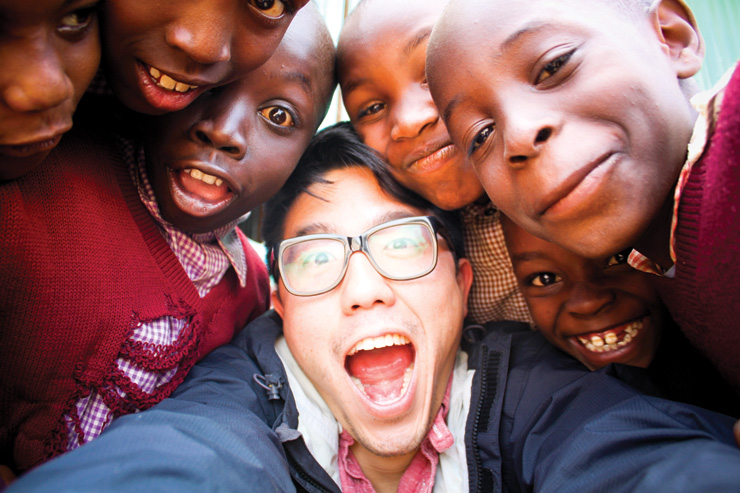Eddo Kim is using his Ivy League education to try to help end extreme global poverty — one school and one slum at a time.
by CRYSTAL KIM
Lacrosse players with their sticks pitched over their shoulder walking to practice; girls dressed to the nines in Lilly Pulitzer and Ralph Lauren; peers lounging on picturesque quads reading Aristotle. These were just a few scenes from Eddo Kim’s daily life on the pristine University of Pennsylvania campus. But at this institution known for its elite student body and endowment in the billions, it’s hard to believe that just outside its gates in West Philadelphia is one of the country’s most blighted communities. For Kim, that place would serve as a classroom of another sort.
Kim, a graduate of UPenn, Columbia University and Harvard University, knows a fair bit about the Ivy League lifestyle. But as the founder and CEO of an international nonprofit called The Supply, he’s using his education for another good: to build schools in slums around the world and give these children living in extreme poverty a chance to empower themselves. What’s notable about The Supply is that it’s focused on creating schools that not only teach core school subjects, but also customizes a civic and human rights education curricula, so that these youth also learn how to help their own communities.
“It’s the idea of us supplying the education to these children, so they can, in turn, become the supply to their communities,” said Kim, during a recent phone interview from New York, where the 29-year-old is based.
An estimated 1.5 billion people in the world live in slums, and that figure is expected to double by 2030, according to the United Nations Organization for Education, Science and Culture (UNESCO). That translates into more than 200,000 children being born into slums every day. The way Kim sees it, that’s 200,000 more children each day who are denied access to basic human rights, such as health and clean water.
 Students at the Matopeni and Lenana school sites in Kenya. All photos courtesy of The Supply.
Students at the Matopeni and Lenana school sites in Kenya. All photos courtesy of The Supply.
The Supply focuses specifically on building low-cost private secondary schools in areas that fall outside the reach of government services. In these blighted zones where children often stop attending school by their 6th birthday, a secondary school has the potential to transform an entire community. A secondary education increases these youths’ chances to access higher education and attain higher-wage jobs, while also decreasing the likelihood of drug use, pregnancy or sexually transmitted diseases.
Since 2010, the young nonprofit has established a secondary school in the Lenana slum of Nairobi, Kenya, and is currently developing another in Matopeni.
***
Kim’s passion for education can be traced back to his days at UPenn.
At the time, the university had begun to promote a service-learning curriculum, encouraging students to become involved in the community. Kim, a Southern California native, immersed himself in neighboring West Philly, starting a hip-hop literacy program at a high school, helping Vietnamese refugee children with college admissions, and participating in weekly focus groups with inner-city students to discuss democratic responsibilities.
“[UPenn] was my first exposure to the larger structural issues such as urban poverty and homelessness,” said Kim. “How could there be an Ivy League gated tower adjacent to one of the worst areas of the U.S.?”
While mentoring Philadelphia youth, he saw the difference that schooling could make in children’s lives. He realized that the “linear path of education”—primary school, secondary school, then college—his Korean parents had guided him towards was not even an option for many.
“Growing up sheltered in California, you just never see poverty,” said Kim. “You maybe go to downtown L.A. once a week with your parents to go to K-town or something. Moving away from home was my first opportunity to start critically thinking about what education was.”
Kim had a renewed idea of education’s purpose: it was not simply the path to a well-paid career; education was a call to action for community engagement to advance the rights of all humans to learn and have fair chances at life. An American history major at UPenn, he began to consider attending graduate school for education. His parents, however, persuaded him to take another route.
“They always saw me as someone who could succeed in the real world. But in their minds, obviously, the ‘real world’ was limited to a specific industry,” said Kim. “And I don’t know what it’s like in Korea, but hearing from my parents, it seemed like education was a respected profession for females. There was a little bit of stigma attached to me pursuing education. Obviously it wouldn’t pay well, too.”
Kim graduated and ended up with a corporate job at an asset management company, creating pitchbooks for Fortune 500 companies. “You can imagine an American history major who goes into a company that deals with billions of dollars, and me like a chicken with its head cut off,” said Kim. “I didn’t enjoy it at all. In the back of my mind, I was always still thinking about pursuing education.”
So Kim did apply to graduate school. But his job and the uncertainty over his future had already taken a toll on his health, as he struggled with depression. “One night I decided that, actually, I was just going to end it. I started popping the pills, and I locked my door. My roommate was bringing up my mail. He busted through, and he was freaking out. He was bringing up my letter of acceptance to Columbia’s Teachers College,” said Kim. He then paused. “It was a very sort of ‘Whoa,’ whether you want to call it divine or sort of ironic. I thought, ‘I cannot let someone, or society, dictate for me where my path should go.’”
 An image from the slums of Lenana.
An image from the slums of Lenana.
Kim quit his job and went to Teachers College to pursue a master’s in education leadership. It was then that he developed his interest in international education, traveling to Nairobi, Kenya, where 60 percent of the population lives in urban slums. “The extreme poverty in these urban slums is unreal. From the heaps of trash that children were playing on, to the stagnant water filled with sewage and human waste, I had never seen anything like it,” he said.
There, Kim met the inspiration behind what would become The Supply. Muscort Musiega was the director of a primary school that Kim visited. Sponsored by a Christian organization to attend secondary school and college, Musiega was one of the lucky few to earn a degree. But instead of moving out of the slums and getting a high-paying job, Musiega returned to his home and built a primary school in his community.
“That kind of rocked my world. During the flight back I remember journaling, ‘If this man can defend these children, I can, too.’ It was completely eye-opening. You talk about access to quality education here. It was a hundred times worse there. I remember coming back and thinking, ‘I have to do something about this,’” said Kim. “I had no experience in nonprofit management. I was starting to dabble into this idea of international education development. But I decided that the least I could do was start fundraising. Now, it’s The Supply.”
Kim recalled the challenges of creating a new nonprofit, while also working on degree No. 3: studying international education policy at the Harvard Graduate School of Education. “It was the scariest thing to do when I completely transferred my savings into my tuition. I was getting into more and more debt, and it was a time when me [and] my staff weren’t taking out any money from our organization in terms of stipends or compensation,” revealed Kim. “There were a couple nights where I would not eat because I literally had no money.”
 Kim, with lead contractor Atuti Ignatius (middle) and school director Muscort Musiega (right).
Kim, with lead contractor Atuti Ignatius (middle) and school director Muscort Musiega (right).
But his time and money were well spent. At Harvard, Kim developed the curriculum that The Supply uses today. The S.L.U.M.S (Student Leaders Understanding My Slums) program emphasizes human rights education and service learning to teach students how to empower and transform their own communities. Students participate in leadership seminars, community service, research projects and civic education, all the while reflecting on how they can solve their own community’s problems.
“It’s not just a general blanket of ‘let’s end global poverty today,’ about plopping education onto everybody. It’s very much [that] there’s a specific community that has very specific needs, and a schooling model needs to be tailored and relevant to that community,” said Kim.
He and his staff research slums where they can build schools and collect household data, focusing on parents’ attitudes towards education and schooling choices. Then, they begin to build relationships with community members, school leaders and families.
“Education cannot be seen as a supply and demand model. The reason why we’re called The Supply is that we believe that, for the ones that are educated, the purpose of education is not to fulfill a demand, but really to be responsible for engaging with your own community’s problems and being a part of the solution,” explained Kim.
The first time Kim visited Lenana, The Supply’s first field site, he met two orphaned boys named Peter and John. “I later found out that these boys take on casual jobs after school to pay for school fees. And, instead of eating lunch every day, they give up lunch to ensure that they can pay for their school fees,” said Kim. “When I asked them why they wanted education so badly, their response profoundly impacted me. From my own frameworks and mindset that I had grown up with, I assumed that they would say that they wanted to become rich and get out of these wretched slums. But they said, ‘I want education badly so that I can help my community and make this world a better place.’”
Youth are an integral part of the supply that Kim refers to. As more young people learn about social justice and international development, Kim hopes they will see the nonprofit sector as a viable career, instead of a “second option,” a steppingstone to another career. He speaks at colleges across the country and meets students who want to start their own service projects.
“I remember talking with a group of kids at Harvard, and they were really interested in a health initiative. Over coffee, we were talking and they had the most brilliant idea. I was like, ‘Man, you guys could really do some great work.’ And they said, ‘Well, we’re going to do this for two years, and then we’re off to med school.’ And that’s something I’ve noticed a lot,” said Kim. “I call it the back pocket idea, where they just kind of keep it in their back pocket even as a gateway to the next thing. I would really just encourage young Korean Americans—if they have an idea—to really create and innovate because weneed them.”
As for The Supply’s future, Kim wants to continue building schools and spreading the message—that we must all become the supply to change the world through education.
“We’re still a small fish in a big pond, but it is possible,” said Kim, who was recently selected the “Emerging Leader in Social Entrepreneurship” by the Korean American League of Civic Action. “We can become pioneers and innovators in this field. It never stops. How could you hear [about] the plights of 1.5 billion people and not move?”
This article was published in the February 2013 issue of KoreAm. Subscribe today! To purchase a single issue copy of the February issue, click the “Buy Now” button below. (U.S. customers only.)






